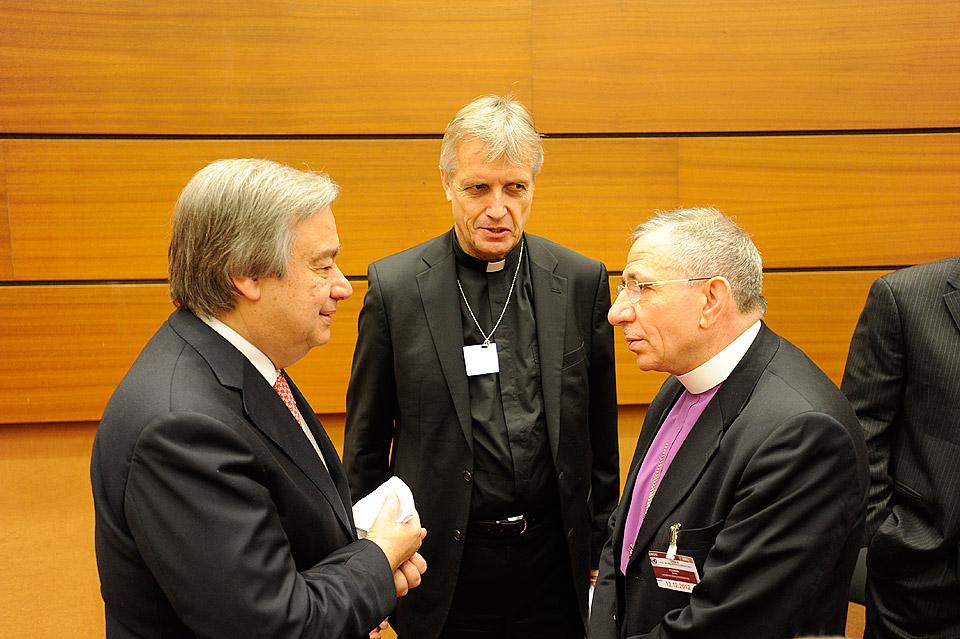UN Dialogue on Faith and Protection Offers Concrete Suggestions

(Left to right) UNHCR High Commissioner António Guterres, LWF General Secretary Rev. Martin Junge and LWF President Bishop Dr Munib A. Younan at the Dialogue on Faith and Protection. © LWF/Peter Williams
LWF Requested to Participate in Drawing Up a Code of Conduct for Religious Leaders
“Sometimes the problem is not what we teach but what we ignore,” said Bishop Dr Munib A. Younan, President of The Lutheran World Federation (LWF), when he addressed participants at a round table of the United Nations High Commissioner for Refugees (UNHCR) Dialogue on Protection Challenges, 12 – 13 December in Geneva.
“Faith and Protection” was the theme of the annual UNHCR Dialogue, which brought together—in an unprecedented meeting—representatives of major faith groups, states, non-governmental organizations and the UNHCR to speak about the particular role of faith-based organizations in taking care of refugees.
At the round table, Younan, who is also bishop of the Evangelical Lutheran Church in Jordan and the Holy Land, shared the example from Jerusalem where a group of Muslim, Christian and Jewish leaders have come together to monitor what they teach about each other. He said the initiative had proved to be a great success in enhancing a common understanding and education about each other.
Younan advocated the example as a possible inspiration for the UNHCR Dialogue meeting. “It is important that religious leaders sign a code of conduct and teach it,” the LWF president stressed.
The idea was embraced by the round table co-chairperson Rabbi Joseph Telushkin, who forwarded it for consideration to the plenary session. When a code of conduct is written into “a document of mutual respect it has the capacity to have a transforming effect,” the Rabbi noted.
Younan said he considered a code of conduct as part of the contribution of faith-based organizations to “strengthen welcoming communities,” a phrase offered by the High Commissioner for Refugees in his opening address to the 400 participants at the Dialogue meeting.
In his concluding remarks to the Dialogue on Faith and Protection, the High Commissioner for Refugees Mr António Guterres summed up the concrete suggestions from this year’s meeting, which included the creation of a common code of conduct for religious leaders. He suggested that the LWF and other organizations involved in preparing this year’s meeting coordinate the preparation of a first draft of a code of conduct to be shared with religious leaders, and eventually presented at the High Commissioner’s annual meeting with NGOs in 2013.
“There are indeed many documents and agreements that could be taken as a starting point of such a code of conduct,” added LWF General Secretary Rev. Martin Junge in his concluding remarks at the plenary session following the round table discussions. “Such a document would state our basic understanding and outline the obligations, which faith based organizations engaged in the protection of refugees would commit to.”

